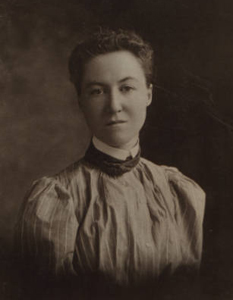 The Manuscripts and Archives Department recently acquired a unique scrapbook which belonged to Marguerite du Pont Lee (1862 -1936), sister of Alfred I. du Pont. Born in 1862 in the Wilmington area to Éleuthère Irénée du Pont (1829-1877), and Charlotte Henderson du Pont (1835-1877), Marguerite du Pont Lee spent her childhood at the family home on Brecks Lane, ‘Swamp Hall’ near the powder mills of which bears her family name.
The Manuscripts and Archives Department recently acquired a unique scrapbook which belonged to Marguerite du Pont Lee (1862 -1936), sister of Alfred I. du Pont. Born in 1862 in the Wilmington area to Éleuthère Irénée du Pont (1829-1877), and Charlotte Henderson du Pont (1835-1877), Marguerite du Pont Lee spent her childhood at the family home on Brecks Lane, ‘Swamp Hall’ near the powder mills of which bears her family name.
At age 15, the then Miss du Pont was orphaned along with her four siblings when her parents died just over a month apart. Her mother, Charlotte du Pont, had been committed to an insane asylum following an attack of hysteria likely brought on when she returned from a trip to Europe in search of a state of better mental health and relaxation, to find her children beaten, and nearly starved by their nurse. The emotional stress of the incident was too much to handle for the mentally fragile Charlotte. She was taken to an insane asylum where she died on August 19, 1877. Her husband would die twenty-nine days later on September 17th of consumption, aggravated by exposure from working in the family powder mills.
Leaving five orphaned children and a home owned by the DuPont Company, the family elders planned to split up the five orphan’s amongst relatives. When word reached Swamp Hall that their uncle Alfred Victor du Pont was on his way to the home to break up the family, the five children took arms, young Marguerite du Pont with a rolling pin, Alfred with a shotgun, Annie with an ax, Maurice a pistol, and Louis a bow and arrow. After much negotiation and a report made back to the head of the family, Henry du Pont, who yielded and allowed the children to remain in the home under the supervision of the oldest daughter, Annie, along with their loyal house staff.
After leaving Wilmington, young Marguerite met Cazenove Gardner Lee whom she married on September 20, 1881. Settling in the Georgetown section of Washington D.C., Lee became very involved in both social and political affairs which are reflected in her scrapbook through hundreds of newspaper clippings and editorials. One area in which Mrs. Lee spent a great amount of time and money on beginning in 1898 was the Kemper Bobcock Memorial settlement house. Settlement houses were typically founded by educated, wealthy women and provided programs such as education, recreation, and day care to the impoverished of the city. Lee’s own settlement house included a kindergarten, mothers club, and provided gendered programming such as cooking and sewing for women and sports for males. Lee not only was the home’s founder, but also taught classes on capital and labor, temperance, religion, and suffrage.
Mrs. Lee’s scrapbook not only contains clippings and material related to settlement houses but also to women’s suffrage of which she collected numerous articles. Lee was a social activist and voice for the impoverished and less fortunate of Washington. One article notes that when the Commissioners of Washington stopped supplying free water to the poor from fountains, Lee had one erected through a wall on her property, which was also later shut off by the district but not without protest in the local papers. Lee was also a supporter of the right to vote for women as evidenced in her scrapbook through clippings. In fact, one article even mentions that the cousin of Senator du Pont (Henry A.) was “Rebuked for Opposing the Resolutions” that were set forth by President Taft on the topic of suffrage.

The prevention of child labor was another cause supported by Lee as shown scrapbook with an accompanying photograph of a march held in Washington D.C. The scrapbook also contains various clippings regarding du Pont family weddings and events such as the 100th reunion of the du Pont family, as well as DuPont plant accidents and explosions. Also included are various religious writings and passages as well as commentary on politics in the early twentieth century which are also examined through political cartoons. The last few pages of the scrapbook contain various DuPont powder container labels.
Andrew Engel is an archivist in Hagley's Manuscripts and Archives Department.
